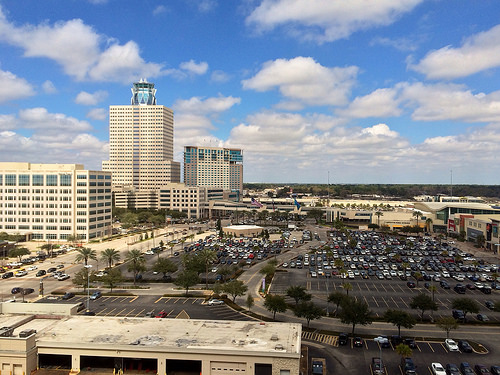
- City Council Voting Today on Plan To Grant Tax Breaks for Redeveloping Distressed Properties [Houston Chronicle ($)]
- Downtown Redevelopment Authority Considering Tax Break for Redevelopment of Savoy Hotel [Houston Chronicle ($); previously on Swamplot]
- BB’s Cafe Opening Fourth Houston Location in Former Ninfa’s, El Taco Tote in Briargrove Area [Culturemap]
- Snap Kitchen Opening New Locations This Year Downtown and in the Heights, Also Looking Outside the Loop [Houston Business Journal]
- New, ‘Hidden’ Barringer Bar Opens Quietly Above Clutch City Squire on Main Street Downtown [Culturemap]
- Bridgeland Adding Retail and Apartments, Setting Aside Land for Up to 8 More Schools [Houston Business Journal]
- Residents Near Oates St. and I-10 E Once Again Protesting Proposed Low-Income Apartment Complex Up for City Council Vote [abc13]
- Prada Marfa Painted Blue, Strewn with TOMS Logos in Second Act of Vandalism [Glasstire]
- Review: ‘Houston’s Hermann Park’ an Uneven but Valuable Reference Documenting the Public Space’s Development [The Architect’s Newspaper]
Photo of 1-10 at Gessner: Russell Hancock via Swamplot Flickr Pool
Headlines





What counts as distressed?
The blight-demolition tax credit is a great idea, and I hope it passes. Real estate experts have well defined criteria for what counts as distressed, so that’s not an issue. And any costs they incurred will be repaid in the long run through increased valuations near the properties in question.
.
The only thing I would add, as I noted in the article on the Chronicle website, is that landmarks and properties in historic districts should not get tax credits for demolition. In these cases, the tax credits should be for restoration and preservation measures.
“Distressed” is defined as any building under a repair or demolish order from the City. Sec. 10-371 of the Code of Ordinances sets forth the standard for dangerous buildings subject to repair/demolition orders. There are notice and hearing requirements. It is not an easy thing for the city to get done and tends to only go after the worst of the worst.
There are already tax benefits for renovating in a historic district. They are not very significant, but are something. And you cannot demolish a structure without approval from the HAHC in a historic district. The proposed tax incentive would not do much in historic districts as it only applies to commercial property.
The real problem with blight is that it is incredibly difficult for the City to foreclose on blighted properties due to the strict notice requirements which were beefed up due to recent court opinions. Owners of blighted property can sit for years, wait for everyone else to improve the area and then flip their property for a huge profit. As long as they do not pick up certified mail and hold property through business entities with no clues as to their whereabouts (individual name/address), they will never get served. Or, as it is often the case, property with ownership/title issues are incredibly difficult for the City to take because the ownership issue has to be resolved before there can be foreclosure.
so if it’s so hard to track down owners of blighted properties to serve them, who is able to still purchase these properties and get the tax credits for redevelopment? is this basically something that only the large corporate real estate companies are able to deal in or are there independendt property owners going around and partaking in this?
Philadelphia has a ten-year tax abatement for significant improvements. I’m not sure I like the policy, but it does achieve its stated goal – construction costs are very high there, but there has been a huge boom in new construction.
I’ve spent some time in my career tracking down the sort of person that doesn’t like paying bills, receiving official notices or summonses, or anything at all like that. And yeah, it’s usually some individual or a tight family, often living out-of-state. A big corporation could never pull it off so easily.
Even if the City levies fines against the owner and eventually forecloses the property and sells it at a constables’ auction, the title is still marred because the previous owner might come back to challenge the sale over issues of notice. That doesn’t happen terribly often, but it does happen and its in the back of any would-be bidder’s mind at the auction. Of course, that means that the risk and the back taxes are already priced into a bid, that bids are often abysmally low, and that there’s not terribly much incentive for the City to throw good money after bad. It doesn’t mean that they won’t or shouldn’t. But I’ll bet that if they could recover more of what they put into it, that you’d see the City getting a lot more aggressive, right quick.
@ WAZ: Developer-speak for a “distressed property” tends to reflect concerned with the stability of cash flows or sometimes the stability of a tenant base. In such a case, I think that you would probably consider such a property to also be distressed. However, once some opportunistic buyer has come along and changed out the management company and made only the most essential repairs over the first year and finished re-tenanting during the second year — well it might be a stabilized asset at that point once again but you might also think that it was still crappy enough to warrant its replacement.
@ Old School: Having said the above… Meanwhile, as far as the City is concerned, it may never have qualified as “distressed” in the first place.
Not a good move by BB’s. Not the greatest little parcel of Westheimer. Directly across from Lam Bo Chinese Buffet and just East of shady strip clubs.